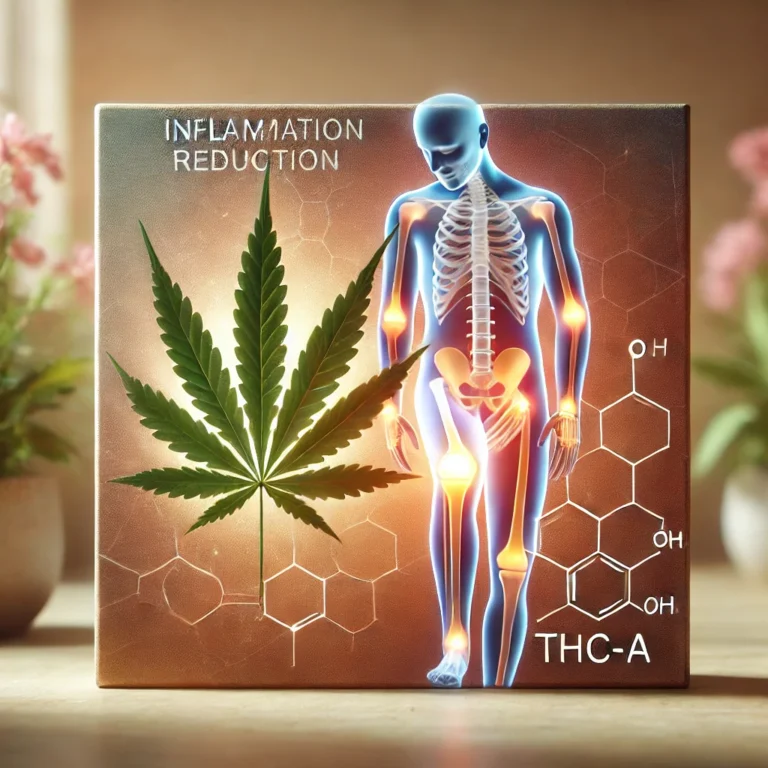Hey there, wellness seekers! Have you ever wondered about natural ways to tackle inflammation? If you’re like me, you’re always on the lookout for holistic solutions that support your body’s natural healing processes. Enter THC-A, a fascinating compound found in raw cannabis. Today, I’m diving deep into the science behind THC-A and its potential to help with inflammation. So grab a cup of tea (or juice, if you’re into THC-A juicing like me) and let’s explore this together.

Before we talk about inflammation, let’s cover the basics. THC-A stands for tetrahydrocannabinolic acid, the raw, non-psychoactive precursor to THC. It’s found in fresh cannabis leaves and flowers and remains non-intoxicating until heated, a process called decarboxylation. That means you can enjoy its potential benefits without feeling high.
Scientists have started to uncover some impressive therapeutic properties of THC-A, including its role in reducing inflammation. But how does it work? Let’s break it down.
Inflammation is your body’s natural response to injury, infection, or stress. While acute inflammation (think swelling after a sprain) is essential for healing, chronic inflammation can lead to a host of health issues, including arthritis, autoimmune disorders, and even heart disease. That’s why finding effective ways to manage inflammation is so important.

THC-A has been shown to inhibit COX-1 and COX-2 enzymes, which play a key role in the inflammatory response. By targeting these enzymes, THC-A may help reduce inflammation at its source.
While THC primarily activates CB1 receptors (associated with the brain and psychoactive effects), THC-A is thought to primarily influence CB2 receptors. These receptors are found in immune cells and tissues and are directly involved in modulating inflammation.
Oxidative stress can exacerbate inflammation, and THC-A has demonstrated antioxidant activity in preliminary studies. By neutralizing free radicals, it may help mitigate inflammatory damage.
While research on THC-A is still in its early stages, some promising studies suggest its potential:
Animal Studies: A 2011 study found that THC-A reduced inflammation and pain in rodents with arthritis. This suggests that it could be beneficial for people with similar conditions.
In Vitro Research: Lab studies have shown that THC-A can suppress inflammatory markers, further supporting its potential as an anti-inflammatory agent.
Human Anecdotes: Although clinical trials are limited, many individuals report using raw cannabis or THC-A products to manage chronic pain and inflammation effectively.
If you’re intrigued by THC-A’s potential, here are some ways to incorporate it into your wellness routine:
One of the easiest ways to consume THC-A is by juicing raw cannabis leaves and flowers. This method preserves the cannabinoid’s raw form and delivers it in a nutrient-rich, bioavailable format.
Some companies offer THC-A tinctures and capsules designed for easy dosing. These are great if you want a convenient, controlled way to incorporate THC-A into your routine.
For localized inflammation, THC-A-infused balms and creams can be applied directly to the skin. This is especially helpful for joint pain or muscle soreness.
If you’re feeling adventurous, you can make your own THC-A edibles using raw cannabis. Just avoid heating it to keep the THC-A intact.

Before you start using THC-A, here are a few things to keep in mind:
Consult a Professional: Always talk to a healthcare provider, especially if you’re taking other medications or have underlying health conditions.
Know Your Source: Use organic, pesticide-free cannabis to avoid unwanted chemicals.
Legal Status: THC-A’s legality varies by region, so make sure you’re following local laws.
I started exploring THC-A to manage occasional joint pain, and I’ve been amazed at how well it works. Juicing raw cannabis has become a weekly ritual for me, and I’ve noticed a significant improvement in how my body feels. Plus, it’s a fun and tasty way to add more greens to my diet!
THC-A is an exciting frontier in natural wellness, offering a non-intoxicating way to potentially reduce inflammation and support overall health. While research is still emerging, the early evidence and anecdotal reports are promising. Whether you’re dealing with chronic inflammation or just curious about cannabis’s raw potential, THC-A is worth exploring.
Have you tried THC-A for inflammation or other health concerns? I’d love to hear about your experiences! Let’s keep the conversation going and support each other on this journey to better health.
Join our community of cannabis enthusiasts and terpene explorers! Get exclusive insights, in-depth guides, and the latest discoveries. No spam—just pure, aromatic knowledge delivered straight to your inbox.
Subscribe now and elevate your cannabis wisdom!